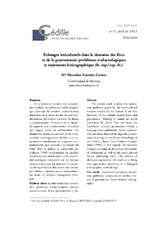Échanges lexiculturels dans le domaine des fêtes et de la gastronomie: problèmes traductologiques et traitement lexicographique (fr.-esp./esp.-fr.)
Autor
Eurrutia Cavero, Mª Mercedes
Editor
UCOPressFecha
2013Materia
Estudio semántico contrastivoProblemas traductológicos
Matices socioculturales
Léxico gastronómico y festivo
Planteamientos lexicográficos
Constrastive semantics
Translation problems
Sociocultural studies
Lexicon of gastronomy
Festive lexicon
Lexicography
METS:
Mostrar el registro METSPREMIS:
Mostrar el registro PREMISMetadatos
Mostrar el registro completo del ítemResumen
En el presente estudio nos proponemos analizar los problemas traductológicos que plantean los matices socioculturales implícitos en el léxico de dos sectores fundamentales del ámbito turístico: las fiestas y la gastronomía. Partiremos de la hipótesis según la cual la penetración cultural de una lengua carece de uniformidad. Las disimetrías léxicas se acentúan en las interacciones interlingüísticas debido a un conocimiento insuficiente de imágenes complementarias que remiten a la cultura del Otro. Bajo el prisma ya adelantado por Galisson (1991) analizaremos los cambios semánticos que intervienen en la creatividad neológica insistiendo en los factores socioculturales que los motivan. La ausencia de equivalentes discursivos nos llevará, por último, a aportar nuevos planteamientos desde un enfoque lexicográfico bilingüe. The present study analyzes the transla-tion problems posed by the sociocultural nuances implicit in the lexicon of two key branches of the tourism sector: feasts and gastronomy. Bearing in mind an initial hypothesis by which You will leave the hypothesis cultural penetration within a language lacks uniformity, lexical asymmetries are most observed in linguistic interac-tions featuring an insufficient knowledge of the other’s culture. From Galisson’s stand-point (1991), I will explore the semantic changes occurring in the process of creation of neologisms as well as the sociocultural factors underlying them. The absence of discourse equivalents will lead us to bring new approaches stemming in a bilingual lexicographic methodology.

